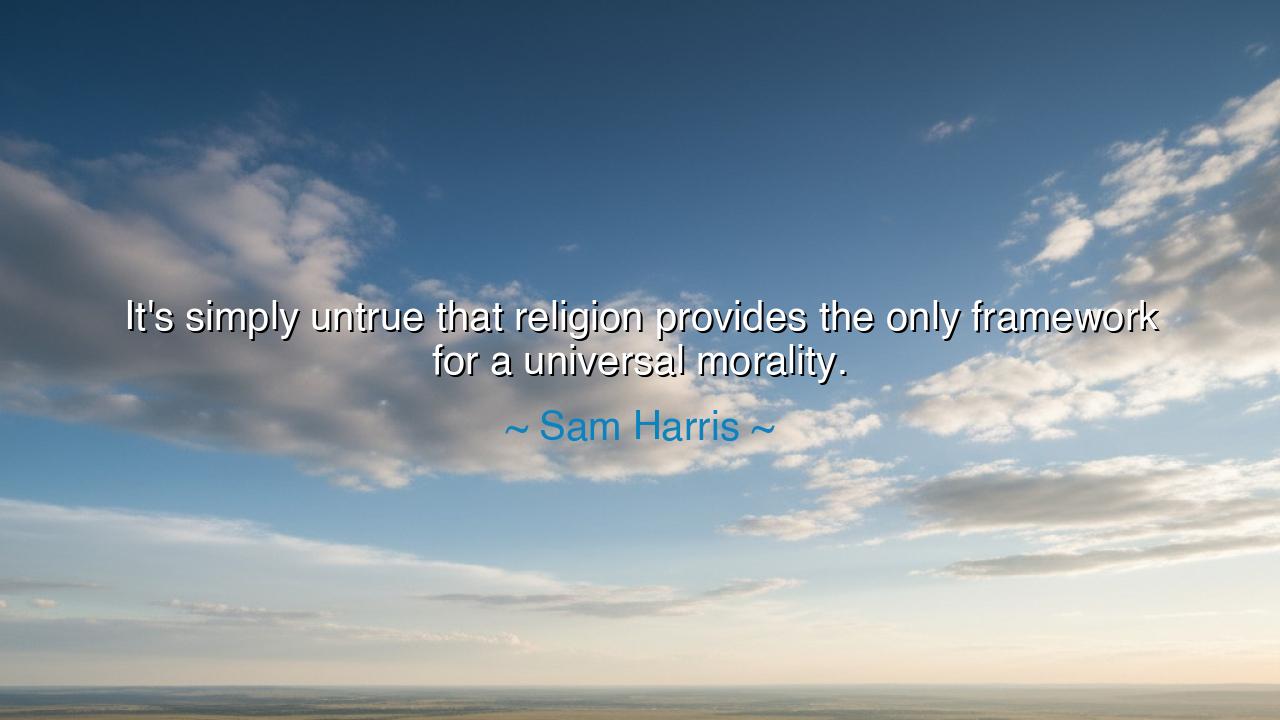
It's simply untrue that religion provides the only framework for






"It's simply untrue that religion provides the only framework for a universal morality." These words spoken by Sam Harris stand as a bold challenge to the age-old assertion that religion is the sole guardian of moral law. For centuries, humanity has been told that moral behavior is inseparable from faith—that without religious doctrine, there can be no true guide for right and wrong. But Harris dares to say that this is a fallacy, that morality is not the exclusive domain of any one belief system. He argues that ethical conduct and moral reasoning can and do exist outside the bounds of religious teachings, calling for a broader, more inclusive understanding of what it means to live a moral life.
In the teachings of the ancient philosophers, we find a tradition of moral reasoning that stands apart from religious dogma. Socrates, for example, questioned the very foundation of ethical conduct, searching not for divine commandments, but for universal truths that applied to all people. In his dialogues, he argued that virtue was rooted not in religious observance, but in the ability to reason, to reflect, and to choose actions that fostered the well-being of the individual and the community. The ancients understood that morality was not a gift handed down by gods, but something that could be discovered through human reflection and the pursuit of wisdom. Socrates himself was a living example of this, dedicating his life to exploring the nature of goodness, justice, and virtue through dialogue and rational thought.
The Stoics, too, offer a vision of morality independent of religion. Epictetus and Marcus Aurelius taught that moral virtue was a matter of aligning oneself with nature and the universal reason that governed the cosmos. In their eyes, moral behavior was not about following a set of divine decrees, but about understanding the natural order of things and acting in accordance with it. They believed that virtue—living in harmony with reason, justice, and self-control—was something accessible to all people, regardless of their religious affiliations. Their moral system was universal, rooted not in the doctrines of any one faith but in the rational understanding of the world and our place within it.
Consider, too, the example of Mahatma Gandhi, whose commitment to nonviolence and truth was grounded not in religious texts, but in his deep ethical convictions. Gandhi’s moral code was shaped by the principles of ahimsa (nonviolence) and satyagraha (truth force), ideas that resonated deeply with the Indian tradition, but were not tied to any single religious doctrine. His morality was a product of his own spiritual journey and his desire to live in a way that honored the dignity of all people. Gandhi’s life illustrates that moral principles can emerge from the heart of an individual’s experience and reasoning, not necessarily from religious scripture. He taught that universal morality could be found through compassion, nonviolence, and a commitment to justice—values that transcended religious boundaries.
In the modern world, we see that moral systems can arise from humanist principles as well. The Enlightenment thinkers like Immanuel Kant and John Locke argued that morality was not the province of the church or the divine, but a matter of human autonomy and reason. Kant's categorical imperative, for example, suggested that moral actions are those that can be universalized—those actions that, when performed by one person, could be performed by all without contradiction. This system of ethics does not require adherence to any religious faith, but rather calls on each person to act according to reason and respect the dignity of others. Kant's vision of moral law was not grounded in scripture, but in the inherent worth of every individual and the duty we have to one another as rational beings.
Thus, Harris’s challenge becomes clear: morality is not the sole province of religion. While religion may offer valuable insights into ethical living, it is not the only path to understanding right and wrong. Human beings are capable of discovering moral truths through their reason, compassion, and experience, whether or not they adhere to a particular faith. The universal nature of morality suggests that we all share a common humanity, and that the principles of justice, fairness, and compassion can be recognized by all people, regardless of their religious backgrounds.
The lesson we take from Harris’s words is not to reject religion but to recognize that the moral life is something that can be cultivated through reason, human experience, and the shared values that unite us as a species. Whether one follows a religious tradition or not, we must strive to live according to the universal principles of justice, compassion, and honor. By doing so, we can build a world where morality is not the exclusive domain of any one group, but a shared commitment to the well-being of all. Let us then pursue goodness not just through faith, but through our shared humanity—through the wisdom of reason, the light of compassion, and the strength of justice.






AAdministratorAdministrator
Welcome, honored guests. Please leave a comment, we will respond soon